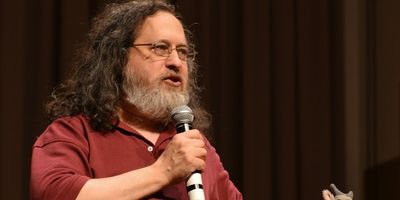Richard Stallman: Difference between revisions
imported>Pat Palmer (more on Emacs) |
imported>Pat Palmer mNo edit summary |
||
| Line 3: | Line 3: | ||
{{Image|Stallman richard 2011 uPenn.jpg|left|400px|Richard Stallman during a 2011 talk he gave for the University of Pennsylvania Computer Science department.}} | {{Image|Stallman richard 2011 uPenn.jpg|left|400px|Richard Stallman during a 2011 talk he gave for the University of Pennsylvania Computer Science department.}} | ||
'''Richard Stallman''' is a software engineer who is founded the [[GNU|GNU project]] and the [[Free Software Foundation]]. Stallman is a tireless campaigner against proprietary software and software patents and what he views as the excessive encumbrances of copyright. He is also known as the developer of the free text editor [[Emacs]] used | '''Richard Stallman''' is a software engineer who is founded the [[GNU|GNU project]] and the [[Free Software Foundation]]. Stallman is a tireless campaigner against proprietary software and software patents and what he views as the excessive encumbrances of copyright. He is also known as the developer of the free text editor [[Emacs]] used in [[Linux]] and [[Unix]] operating systems. | ||
In the 1990’s, the organization he founded to advocate for free software split into two parts: 1) Free Software Foundation (Stallman’s first priority), and 2) the “Open Source” movement (a term coined at the time of the split to differentiate it from the Free Software Foundation). Stallman remained with the Free Software Foundation, focused on the ethical issues surrounding misuse of digital technology and the dangers and hidden costs of relying on proprietary software. The Open Source movement, in contrast, is focused on finding the best ways to develop software as a group, and while Stallman does not disagree with Open Source aims, he chooses to keep the two purposes completely separate. | In the 1990’s, the organization he founded to advocate for free software split into two parts: 1) Free Software Foundation (Stallman’s first priority), and 2) the “Open Source” movement (a term coined at the time of the split to differentiate it from the Free Software Foundation). Stallman remained with the Free Software Foundation, focused on the ethical issues surrounding misuse of digital technology and the dangers and hidden costs of relying on proprietary software. The Open Source movement, in contrast, is focused on finding the best ways to develop software as a group, and while Stallman does not disagree with Open Source aims, he chooses to keep the two purposes completely separate. | ||
Revision as of 13:37, 5 November 2020
Richard Stallman is a software engineer who is founded the GNU project and the Free Software Foundation. Stallman is a tireless campaigner against proprietary software and software patents and what he views as the excessive encumbrances of copyright. He is also known as the developer of the free text editor Emacs used in Linux and Unix operating systems.
In the 1990’s, the organization he founded to advocate for free software split into two parts: 1) Free Software Foundation (Stallman’s first priority), and 2) the “Open Source” movement (a term coined at the time of the split to differentiate it from the Free Software Foundation). Stallman remained with the Free Software Foundation, focused on the ethical issues surrounding misuse of digital technology and the dangers and hidden costs of relying on proprietary software. The Open Source movement, in contrast, is focused on finding the best ways to develop software as a group, and while Stallman does not disagree with Open Source aims, he chooses to keep the two purposes completely separate.
Stallman is a 1974 Harvard University Physics graduate. The GNU project was primarily an ethical initiative which Stallman announced in September 1983 on net.unix-wizards and net.usoft[1]. He began his announcement: "Starting this Thanksgiving I am going to write a complete Unix-compatible software system called GNU (for Gnu's Not Unix), and give it away free to everyone who can use it. Contributions of time, money, programs and equipment are greatly needed." This announcement,[2] is widely thought of as the launch of the free software movement, although its deep roots lie in hacker culture.
